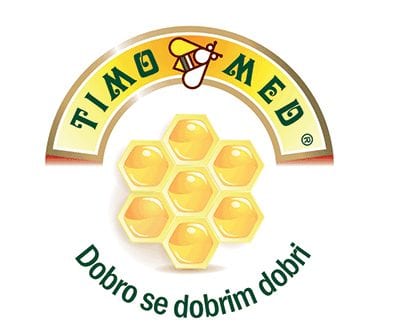Higher bulk buy prices and state subsidies for organic honey
Timomed has been operating successfully already for 31 years, thanks amongst other things to good cooperation with collaborating bee-keepers, and is currently working on marketing its products abroad after offering organic acacia, linden and meadow honey on the domestic market.
It was a few years ago that Timomed took the bold move of advancing its production and enriching its already wide and recognisable range with the addition of organic honey. What types of organic honey are in your offer and where do you sell them?
 – Our offer for the domestic market includes organic acacia, linden and meadow honey. Our organic honey is sold at DM retail outlets and some health food shops. We are planning to sell organic honey abroad and are working on that, but we still don’t have sufficient quantities of honey for export, while the beehives of our collaborators are undergoing conversion for the production of organic honey for export.
– Our offer for the domestic market includes organic acacia, linden and meadow honey. Our organic honey is sold at DM retail outlets and some health food shops. We are planning to sell organic honey abroad and are working on that, but we still don’t have sufficient quantities of honey for export, while the beehives of our collaborators are undergoing conversion for the production of organic honey for export.
How are your experiences in the process of transiting to organic production, when it comes to regulations, rules and costs? What are the specificities of organic honey and how are its export prospects, given the growing demand for organic products around the world?
– Organic production is strictly controlled production. We have collaborators who work in organic production, but all the quantities of honey they have produced are not classified as organic if the bee-keeper has violated any of the postulates of organic production. Apart from the fact that organic production demands the respecting of certain rules and principles, organic production is also expensive. A bee-keeper operating in organic production may place hive colonies in areas without pollutants, so during the honey harvest period bee colonies are only allowed to collect pollen in places where no modern agricultural production is present.
Such places are difficult to find today, even in legally protected places (such as nature parks), because unscrupulous owners of agricultural land also apply pesticides in such places. Another major problem is that municipal leaders across the entire territory Serbia, despite having a specific protected territory, indiscriminately give citizens fruit seedlings that they plant in the aforementioned places and thus endanger organic production.
Organic production can be carried out by bee-keepers who love people, bees and nature generally, who know the importance of sustainable development and who consider the benefits of their product to human health
Organic production is expensive, because bee-keepers mostly locate hives at higher altitudes, where there are smaller amounts of pollen that are also collected during a short period of time. Organic production is also uncertain, because bee-keepers operating in organic production can see their bee colonies die due to the appearance of some disease or parasite, and in organic production they are not permitted to treat bee colonies with conventional remedies. No residues of medicines can be contained in organic honey.
Organic production can be carried out by bee-keepers who love people, bees and nature generally, who know the importance of sustainable development and who consider the benefits of their product to human health. In recent times, due to the global economic crisis, buyers from abroad have been seeking cheap honey, and not organic honey. At present, alongside the higher purchase price of organic honey, producers of organic bee products in Serbia receive a higher subsidy for their bee colonies compared to conventional production.
In parallel with the development of your company, you also work constantly on improving bee-keeping in Serbia generally, educating producers and developing cooperative relations with them. What’s new in that segment – when it comes to the number of bee-keepers you work with and bulk purchases?
– Timomed has existed for 31 years already, thanks also to good cooperation with collaborating bee-keepers. Timomed secures raw materials and a market for the placement of bee products, while collaborators provide the product.
